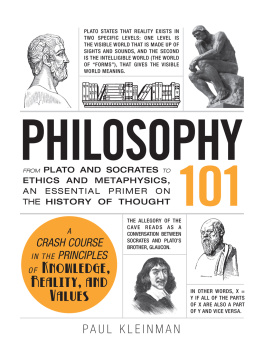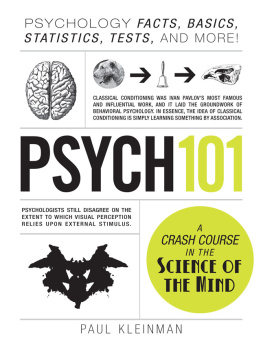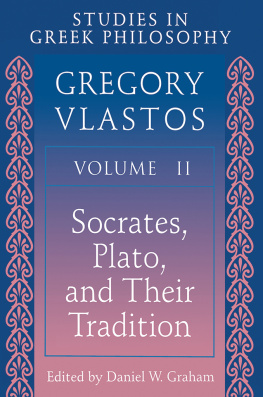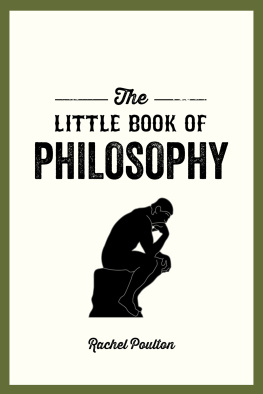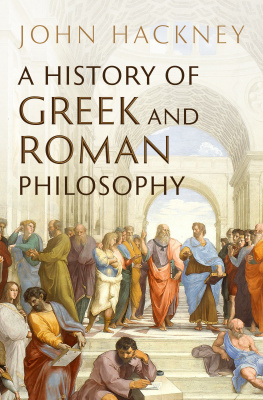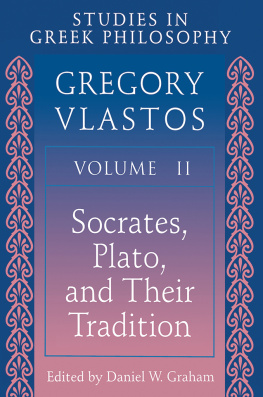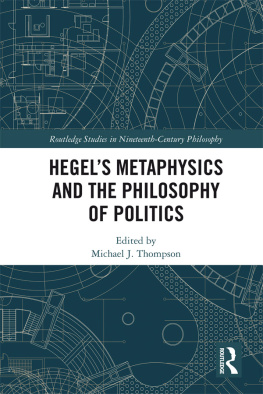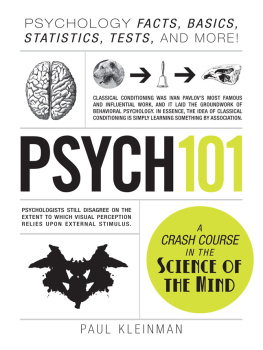PHILOSOPHY
101
FROM PLATO AND SOCRATES TO ETHICS AND METAPHYSICS, AN ESSENTIAL PRIMER ON THE HISTORY OF THOUGHT
PAUL KLEINMAN

Avon, Massachusetts
INTRODUCTION
What Is Philosophy?
The very question sounds philosophical, doesnt it? But what exactly does that mean? What is philosophy?
The word philosophy means love of wisdom. Indeed, it is a love of wisdom that guides philosophers to explore the fundamental questions about who we are and why were here. On the surface, philosophy is a social science. But as you read this book, youll discover that it is so much more than that. Philosophy touches on every subject you could possibly think of. Its not just a bunch of old Greek guys asking each other questions over and over again (though it has its fair share of that as well). Philosophy has very real applications; from the ethical questions raised in government policy to the logic forms required in computer programming, everything has its roots in philosophy.
Through philosophy, we are able to explore concepts like the meaning of life, knowledge, morality, reality, the existence of God, consciousness, politics, religion, economics, art, linguisticsphilosophy has no bounds!
In a very broad sense, there are six major themes philosophy touches on:
- Metaphysics: The study of the universe and reality
- Logic: How to create a valid argument
- Epistemology: The study of knowledge and how we acquire knowledge
- Aesthetics: The study of art and beauty
- Politics: The study of political rights, government, and the role of citizens
- Ethics: The study of morality and how one should live his life
If youve ever thought, Oh, philosophy. Ill never be able to understand that stuff, then fear not. This is the crash course in philosophy that youve always wanted. Finally, youll be able to open your mind without making your eyes bleed.
Welcome to Philosophy 101.
PRE-SOCRATIC
The origins of Western philosophy
The roots of Western philosophy can be found in the work of Greek philosophers during the fifth and sixth centuries. These philosophers, later referred to as pre-Socratic, started to question the world around them. Rather than attributing their surroundings to the Greek gods, these philosophers searched for more rational explanations that could explain the world, the universe, and their existence.
This was a philosophy of nature. Pre-Socratic philosophers questioned where everything came from, what everything was created from, how nature could be described mathematically, and how one could explain the existence of plurality in nature. They sought to find a primary principle, known as arch, which was the basic material of the universe. Due to the fact that not everything in the universe looks the same or remains in the same exact state, pre-Socratic philosophers determined that there must be principles of change that the arch contained.
WHAT DOES PRE-SOCRATIC MEAN?
The term pre-Socratic, meaning before Socrates, was popularized in 1903 by German scholar Hermann Diels. Socrates was actually alive during the same time as many of the pre-Socratic philosophers, and therefore the term does not imply that these philosophies existed prior to those of Socrates. Rather, the term pre-Socratic relates to the difference in ideology and principles. While many pre-Socratic philosophers produced texts, none have fully survived and most of what we understand about the pre-Socratic philosophers is based on the fragments of text that remain and the quotes of later historians and philosophers, which were usually biased.
IMPORTANT PRE-SOCRATIC SCHOOLS
The Milesian School
The first pre-Socratic philosophers existed in the city of Miletus, along the western coast of Anatolia (modern Turkey). From Miletus came three important pre-Socratic philosophers: Thales, Anaximander, and Anaximenes.
Thales
One of the most important pre-Socratic philosophers, Thales (624546 b.c.), claimed the arch, or the single element, was water. Thales determined that water could experience principles of change like evaporation and condensation, therefore allowing for it to be gaseous or solid. He also knew that water was responsible for moisture (which heat was generated from) and nourishment. Thales even believed the earth floated on water.
Anaximander
Following Thales, the next major philosopher to come out of Miletus was Anaximander (610546 b.c.). Unlike Thales, Anaximander claimed the single element was actually an undefined, unlimited, and indefinite substance, known as apeiron. From this, opposites like moist and dry and cold and hot separated from each other. Anaximander is known for being the first philosopher that we know of to have left writings of his work.
Anaximenes
The last important pre-Socratic philosopher of the Milesian school was Anaximenes (585528 b.c.), who believed the single element was air. According to Anaximenes, air is everywhere and has the ability to undergo processes and become transformed into other things, such as water, clouds, wind, fire, and even the earth.
The Pythagorean School
Philosopher and mathematician Pythagoras (570497 b.c.), perhaps most famous for the Pythagorean theorem named after him, believed that the basis of all reality was mathematical relations and that mathematics governed everything. To Pythagoras, numbers were sacred, and with the use of mathematics, everything could be measured and predicted. The impact and image of Pythagoras was astounding. His school was cult-like, with followers listening to his every word and even his strange rules, which covered anything from what and what not to eat, how to dress, and even how to urinate. Pythagoras philosophized on many areas, and his students believed that his teachings were the prophecies of the gods.
The Ephesian School
The Ephesian school was based on the work of one man, Heraclitus of Ephesus (535475 b.c.). Heraclitus believed that everything in nature is constantly changing, or in a state of flux. He is perhaps most famous for his notion that one cannot step in the same river twice. Heraclitus believed that the single element was fire and that everything was a manifestation of fire.
The Eleatic School
The Eleatic school was based in Colophon, an ancient city not far from Miletus. From this region came four important pre-Socratic philosophers: Xenophanes, Parmenides, Zeno, and Melissus.
Xenophanes of Colophon
Xenophanes (570475 b.c.) is known for his critique of religion and mythology. In particular, he attacked the notion that the gods were anthropomorphic (or took a human form). Xenophanes believed there was one god that, while it did not physically move, had the ability to hear, see, and think, and controlled the world with his thoughts.
Parmenides of Elea
Parmenides (510440 b.c.) believed reality didnt have to do with the world one experienced and that it was only through reason, not the senses, that one would be able to arrive at the truth. Parmenides concluded that the work of earlier Milesian philosophers was not only unintelligible; they were asking the wrong questions to begin with. To Parmenides, it made no sense to discuss what is and what is not, for the only intelligible thing to discuss, and the only thing that is true, is what is (what exists).

